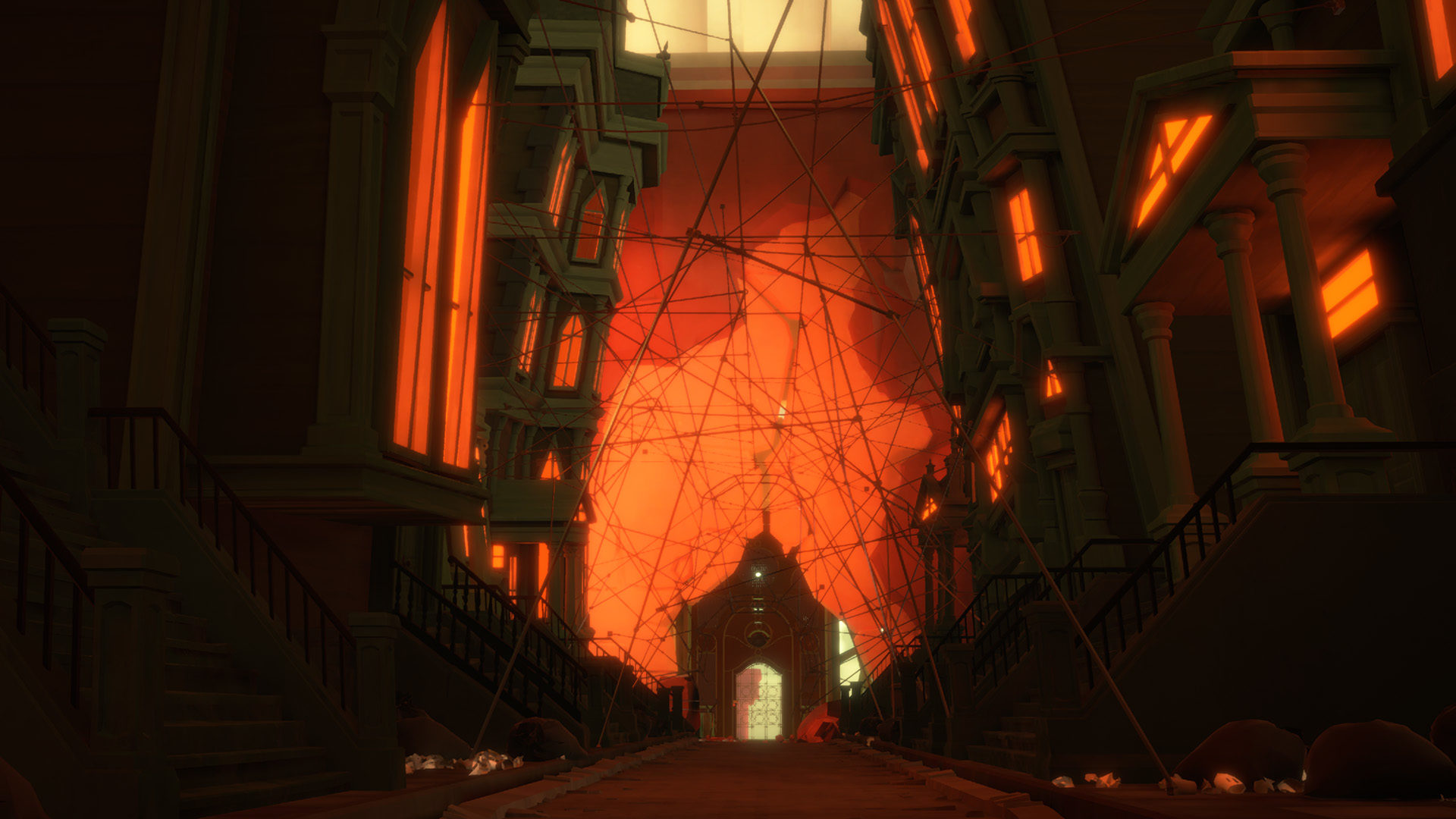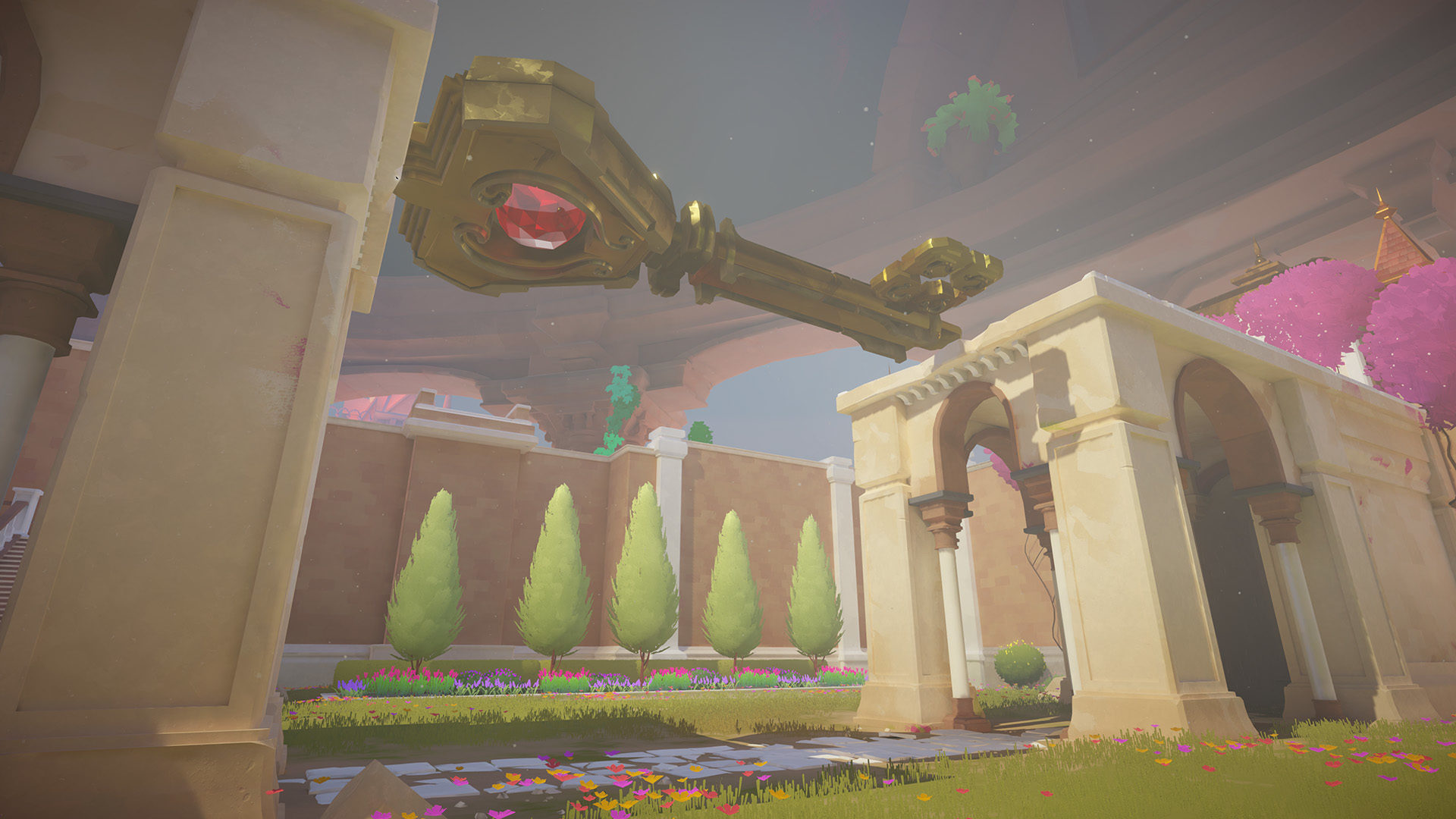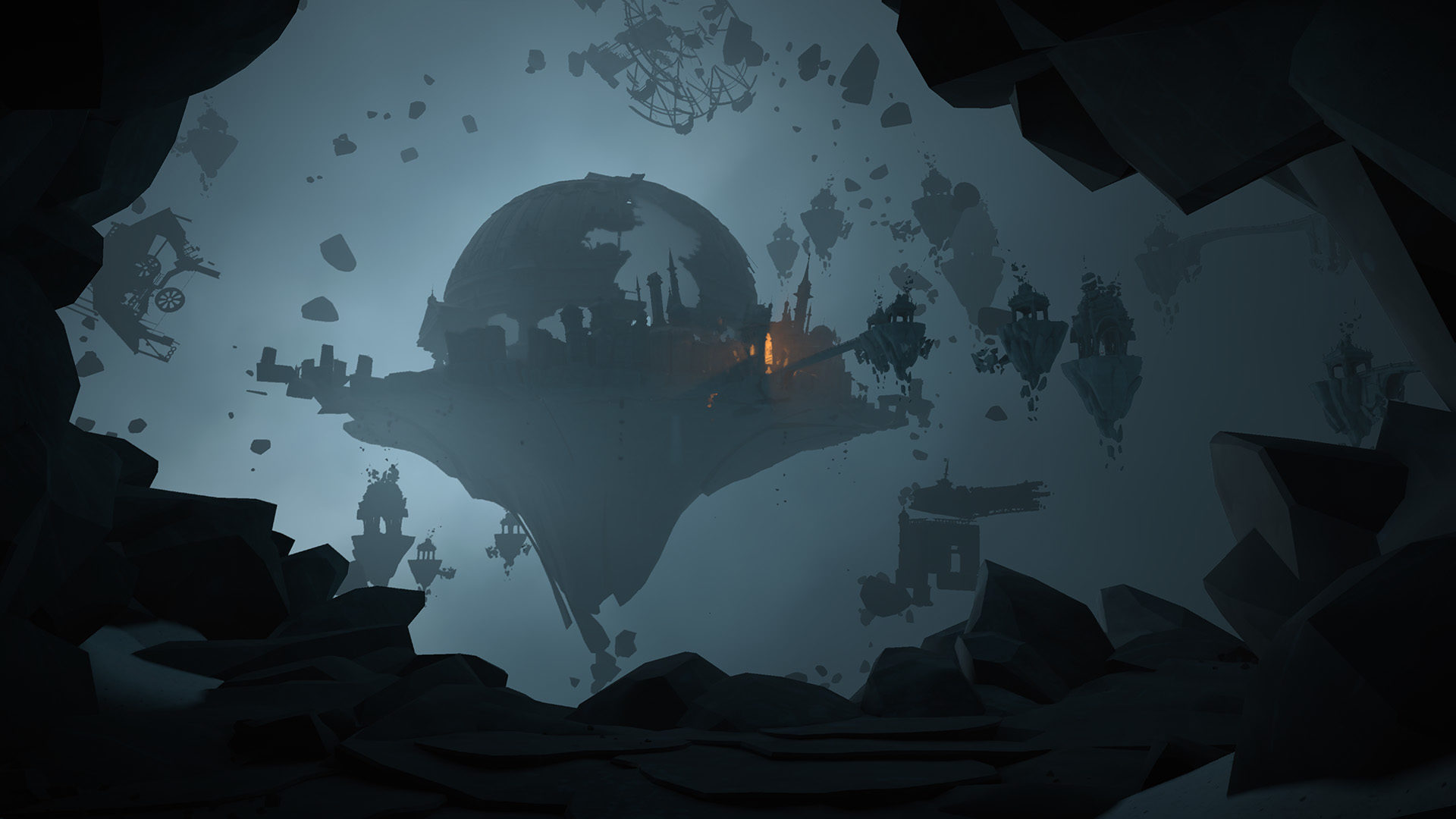If there’s any genre I’m sad to see in decline, it’s puzzle games in the tradition of Portal. After the runaway success of Valve’s 2007 title, developers big and small took the formula and ran with it: Come up with one mind-bending gimmick, and use it to put players through a gauntlet of puzzling fun.
To be honest, that was the reason I was excited to review Maquette, the debut title from indie studio Graceful Decay. Based on the early trailers, it felt like exactly that sort of game. Its big gimmick—and I don’t mean that in a disparaging way—is recursion. Most of the environments you explore are nested, with a smaller version at the center of the larger one, and vice versa. If you pick up an object and place it in the miniature, it’ll drop into the full-scale environment, only much larger. You can even change your own size, relative to your surroundings, by moving in or out of the recursions.
It’s a bit mind-bending and difficult to put into words, so it may help to watch a quick trailer, if you’re having a hard time following.
Because the concept is so interesting, and because it works how you expect, Maquette can devise puzzles around it by only adding a few other interactions: flipping switches, picking up objects, rotating them, and dropping them.
Though I do have a few issues with the puzzles themselves—quite a bit more on that soon enough—the idea has all of the instant magic that made Portal such a blast. It’s weird in a way that forces your mind to adjust to new possibilities, and it’s the sort of thing that you could only ever experience in a video game.
Tying together the puzzles is a loose narrative about two people meeting and falling in love in San Francisco. Most of what you encounter on this front is text—lines from a letter from one half of the couple to the other—that appears in the environment, akin to What Remains of Edith Finch. But there are also brief animated interludes where the two characters are fully voiced by real-life spouses Bryce Dallas Howard and Seth Gabel. The performances are solid, giving the quiet moments in the writing a chance to shine. There’s a great understanding of the little aspects of relationships, good and bad, that shines through even in the brief time we spend with the characters. Thankfully, Graceful Decay already seems confident enough to let those small moments bear the weight of the story. A game that tries to tackle intimate, human topics always runs the risk (perhaps mechanically appropriate, in this case) of being up its own ass. But this is a small story that knows it’s a small story, and it’s all the better for it.
That’s not to say there aren’t hints at some unity between the gameplay experience and the narrative. Perhaps the point is that love can make you feel bigger or smaller than you actually are—sometimes both at once. Maybe it’s about the recursive nature of memory or thought or emotion, but this is a case where vague thematic suggestions do more than specifics ever could. Putting too fine a point on everything would have ruined the impact.

By contrast, however, I think Maquette‘s puzzle design suffers precisely because it shies away from absolutes. My first playthrough took around 4 hours, according to the PS5’s internal tracker—and I think the game would’ve ended up much more enjoyable if it had bumped up that short run time with more variations on its challenges.
Repetition in games is widely overused—most of what we play these days is, truthfully, longer than it needs to be, all to justify inflated production costs. I’m never going to argue for length for length’s sake. But I think some degree of repetition is at the heart of any great puzzle game, because the essence of the genre’s design is in building complexity around basic principles in ways that force you to reconsider what you think you know.
Think of Portal 2, which routinely introduces a new mechanic and then employs it in different, increasingly complex puzzles. Valve builds up a vocabulary of actions and ideas over time, and makes you a maestro of stringing those verbs together. If you’d just gotten dropped into the last puzzle of any given area, you’d be staring at it, totally confused as to what to do. But if you’d only had to tackle the basics, you wouldn’t feel nearly as fulfilled.
In Maquette, you’re not really learning to solve a direct chain of puzzles linked by a core principle. The recursion is used as more of a unifying concept and less of a mechanic in the traditional game design sense. Yes, you make many things larger or smaller, or you might get larger or smaller. But it’s a simple lesson, and the wrinkles Graceful Decay adds into it are mostly one-off riffs, not part of a growing set of solutions.

As a result, the puzzles are less descendants of each other and more cousins—sometimes quite distant cousins. The upside to this is that nothing overstays its welcome. The downside is that you’re constantly having to figure things out from scratch, which can lead to peaks and valleys in progression. I frequently found myself hitting a (figurative) wall, but with only a couple of the aha moments you usually get from unsticking yourself in a great puzzle game. Most of the time, I wasn’t held up because I hadn’t made the right leap of logic, but because there was some minor detail I hadn’t noticed or trial-and-error experiment I hadn’t attempted.
In isolation, there’s some really good puzzle design here. But puzzles in a puzzle game shouldn’t really exist in isolation. By paring back repetition while increasing variety, the pacing suffers considerably. It’s almost impossible to feel like you’re on a roll. Everything is either obvious or so obtuse you need to think for a few good moments. Add in the facts that the environments are non-linear (at least in layout) and that objects you need can be hidden away, and you’ve got a recipe for wandering around for long, boring stretches, unsure if you have the information or items you need to move forward.
There’s also a lack of polish holding Maquette back. You might expect the intersection of physics and recursion to be a bit finicky, and at times it is. Slotting an object into place in one puzzle in particular is downright frustrating—the item you’re working with is jittery and somehow, jarringly, able to spin your first-person view around towards the other side of the room.
But it’s the bigger stuff that’s more worrying here. In one section, I solved a puzzle to complete a bridge, but said bridge never actually appeared in the full size version of the area. After wandering around confused about what I missed for a few minutes, I reloaded a save and everything worked, like it should have the first time.

And then, in the final area, for reasons I still don’t understand, there’s a crucial object that you can’t pick up with the same button you use to pick up every single object in the game. Usually, as the tutorial tells you, it’s square. In the section I’m talking about, I found the object, noticed the cursor changed indicating I could move it, and pressed square. Nothing. Well, twenty minutes later, after searching the whole area, I went back and just started hammering square to see if I could get any response. Maybe my angle was wrong? At some point I accidentally hit circle—used for placing objects—and I picked it up. (This behavior extended to all of my other interactions with the object for the rest of the game. Other things in the same environment, I could pick up fine using square.) I’m sure this one will be fixed quickly, but it’s crazy to think it wasn’t before they sent the game out for review.
I want to be clear: There’s a definite charm to Maquette, and I think there’s plenty here that Graceful Decay should be proud of, especially given that this is the studio’s first game. But as someone who’s been hoping for a first-person puzzle game revival, I can’t help but feel the finished product is a bit of a letdown. You won’t necessarily regret your time with Maquette, but you’ll likely regret it wasn’t something more.
|
★★★☆☆
Maquette's core concept of puzzle solving in recursive environments is undeniably neat. But despite the handful of wow moments it enables, developer Graceful Decay ends up squandering much of the idea's potential due to pacing issues and rough edges. |
Developer Graceful Decay Publisher Annapurna Interactive ESRB E10+ - Everyone 10+ Release Date 3.2.2021 |
| Maquette is available on PlayStation 5, PlayStation 4, and PC. Primary version played was for PS5. Product was provided by Annapurna Interactive for the benefit of this coverage. EGM reviews on a scale of one to five stars. | |
